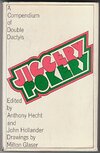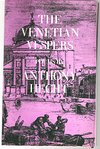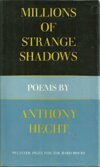Anthony Hecht (1923–2004)
Autore di Collected Earlier Poems
Sull'Autore
Fonte dell'immagine: My Poetic Side
Opere di Anthony Hecht
Melodies Unheard: Essays on the Mysteries of Poetry (Johns Hopkins: Poetry and Fiction) (2003) 48 copie
The Dover Bitch [poem] 2 copie
Seance for a Minyan: Ten Poems 2 copie
The Essential George Herbert 1 copia
Seance for a Minyan 1 copia
Opere correlate
Literature: An Introduction to Fiction, Poetry, and Drama (1995) — Collaboratore, alcune edizioni — 917 copie
For the Love of Books: 115 Celebrated Writers on the Books They Love Most (1999) — Collaboratore — 452 copie
Poetry Speaks Expanded: Hear Poets Read Their Own Work from Tennyson to Plath (2007) — Collaboratore — 151 copie
The Sophisticated Cat: A Gathering of Stories, Poems, and Miscellaneous Writings About Cats (1992) — Collaboratore — 99 copie
Literary Genius: 25 Classic Writers Who Define English & American Literature (2007) — Collaboratore — 90 copie
Sunlight on the River: Poems About Paintings, Paintings About Poems (2015) — Collaboratore — 10 copie
Poem upon the Lisbon disaster = Poème sur le désastre de Lisbonne, ou, Examen de cet axiome "tout est bien" (1756) — Traduttore — 7 copie
Etichette
Informazioni generali
- Data di nascita
- 1923-01-16
- Data di morte
- 2004-10-20
- Luogo di sepoltura
- Bard College Cemetery, Annandale-on-Hudon, New York, USA
- Sesso
- male
- Nazionalità
- USA
- Luogo di nascita
- New York, New York, USA
- Luogo di morte
- Washington, D.C., USA
- Istruzione
- Bard College
Kenyon College
Columbia University
University of Iowa
Horace Mann School - Relazioni
- Kerouac, Jack (classmate)
- Organizzazioni
- American Academy of Arts and Letters (Literature, 1970)
- Premi e riconoscimenti
- Bollingen Prize (1983)
Ruth Lilly Poetry Prize (1988)
Frost Medal (2000)
National Medal of Arts (2004)
Wallace Stevens Award (1997)
Fellowship of the Academy of American Poets (1969) (mostra tutto 9)
Poet Laureate Consultant in Poetry to the Library of Congress (1982-1984)
Fellow of the American Academy in Rome (1969)
Aiken Taylor Award (1989)
Utenti
Recensioni
Liste
Premi e riconoscimenti
Potrebbero anche piacerti
Autori correlati
Statistiche
- Opere
- 31
- Opere correlate
- 30
- Utenti
- 708
- Popolarità
- #35,797
- Voto
- 3.9
- Recensioni
- 6
- ISBN
- 53
- Lingue
- 1
- Preferito da
- 9





















